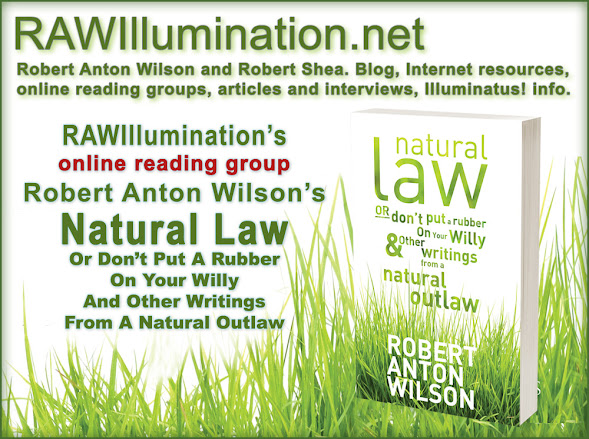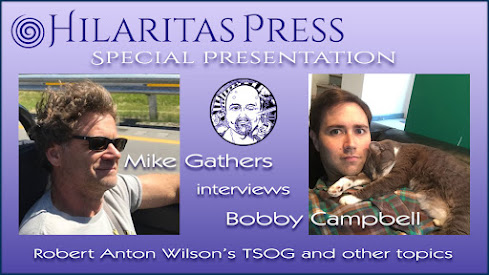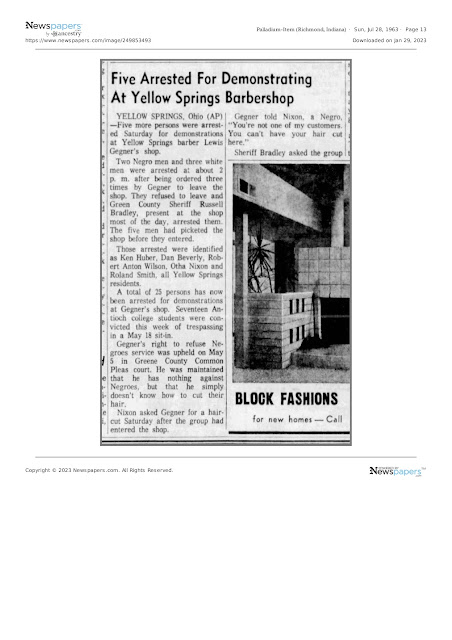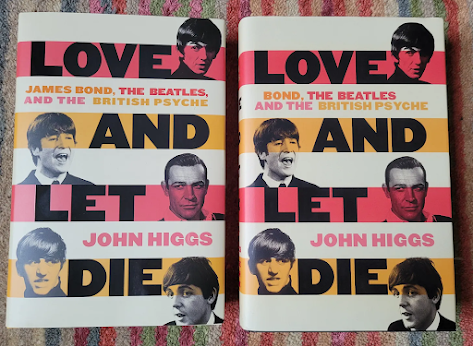Photo by Sander Sammy at Unsplash.com
[I really like the entire Hilaritas Natural Law book, hence this reading group, but I think Chad's discovery and reprinting of "I Opening" is a particularly amazing gift for RAW fans. When I decided to do the reading group, Chad Nelson, the book's editor, offered to do a guest post on "I Opening," and of course I agreed. Here it is. — The Management.]
By Chad Nelson
Special guest blogger
It seemed appropriate to conclude the new edition of Natural Law with something unexpected. After all, that’s the general flavor of the book’s main essay and its companion pieces: weird, contrarian, surprisingly information-dense.
RAW once described his work as an attempt to put LSD into the intellectual water supply. Patrons of RAWIllumination and other longtime Wilson fans have probably built up a tolerance though, so the ideas presented in this book, although profound, may no longer shock our consciences like they did when we originally encountered Wilson. I hope ending the new Natural Law volume with Wilson’s lesser-known 1972 essay "I Opening", represents a flashback of sorts. There were other reality-shattering essays that could have gone in its spot, but I liked ending it with this one for a lot of reasons.
I often wonder what the ultimate practitioner of Maybe Logic, guerrilla ontology, neurological relativism, anarchism, and “that jolly flavor of nihilism — Discordianism,” might look like, and how they’d navigate life. Surely there are countless varieties of such a person, and Hugh Crane is unmistakably one of them. RAW’s “Reichian Rebel” (as Crane is described in Gallery magazine's synopsis of the piece) seems to be a blend of a half dozen or more of the different esoteric traditions and intellectual outcasts that influenced Wilson. Some elements of "I Opening" even seem autobiographical.
Like all of us, Crane was the opposite of a static individual. He is multiple and malleable (he “seemed to be a verb,” as Wilson liked to quote Fuller). The story take us through Crane’s evolution as he experiments with deliberately induced brain change. Throughout, we witness Crane move through various phases: from atheist to “religious nut”, de Sadian “sex maniac” to devoted husband, heir apparent to Houdini to disgraced nightclub act, to name a few of them. Along the way, Wilson inserts Crane into all sorts of historical events, like a subversive Forest Gump. In Crane, Wilson gives us a character willing to evaluate almost every form of cultural conditioning and decide for himself whether to regard them or not. In doing so publicly, Hugh Crane is simultaneously the freest man and the most despised.
Is this the destiny that awaits anyone as bold as Crane in real life? If so, is it a life worth living?
I really appreciated Bobby Campbell’s analysis of the Guns and Dope Party in his recent interview with Mike Gathers. In short, Bobby suggests the Guns and Dope Party is yet another of RAW’s efforts to get us to think for ourselves. It’s sort of the ultimate trickster maneuver: to present an idea so incisive, yet taboo, that Wilson followers are almost guaranteed to parrot it before giving it a second thought. Perhaps there’s an element of that teaching in "I Opening." One must figure out a proper balance between individuality and truth-seeking on the one hand, and coexistence on the other. As heroic as Hugh Crane is, pushing back against every societal norm is fraught with social peril. Contrary though it may be to the romantic brand of free-thinking we’ve learned from Wilson, there may actually be a time and place for falling in line and self-censorship. So what is the right balance between rebellion and conformity? It beats me. It is an interesting paradox many of us grapple with — you really can’t have one mode of being without the other.
Wilson may not have intended for "I Opening" to be as profound as I’m making it (although Crane’s story is later expanded in the Schrödinger’s Cat trilogy, which Wilson hints may be a “ shamanistic manual in the form of a novel”). Regardless, I think RAW’s fiction gives us a depth that’s not always available through his non-fiction. At the end of "I Opening," we come to learn that after Crane’s murder, his disciples (a “cult”) exhibit odd behavior: visiting Crane's murderer in prison, petitioning for his clemency, expressing tolerance for his ideas, and “answering questions with maybe” and he [Crane] was seeking / we are seeking”. Perhaps this is a metaphor for the middle ground we ought to seek as we go about our lives equipped with Wilson’s teachings.
I first read the Hugh Crane material in Schrödinger’s Cat, which came early on in my RAW journey. At the time I read it, most of the references to other historical renegades and occult philosophies were lost on me. But as I continued to read Wilson’s other work, and those he was influenced by, I began to pick up on the meaning of those obscure references. For instance, it only recently occurred to me that much of Crane’s story parallels the real life adventures of Aleister Crowley. I was also initially unfamiliar with the concept of ego dissolution (described in Crane’s prison notes), a concept I now understand is an experience that binds so many ancient spiritual traditions — helping me understand the meaning behind the title "I Opening." I’m sure I’ll continue to find others, which is another reason I’m always fond of revisiting this story.




.jpg)

.jpg)








.jpg)







